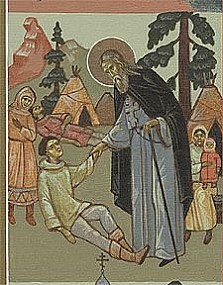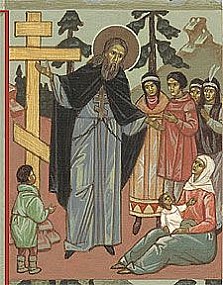|
|||
|---|---|---|---|
| This weekly bulletin insert complements the curriculum published by the Department of Christian Education of the Orthodox Church in America. This and many other Christian Education resources are available at http://dce.oca.org. | |||

In Saint Paul's first Epistle to the Corinthians (12: 12-26) he uses striking images to claim that each human being has the same worth in the eyes of God. In these verses Paul is trying to show the Corinthians how dangerous the divisions in their church have become. He has already said that the various spiritual gifts are equally important, because they are "inspired by one and the same Spirit, who apportions to each one individually as He wills" (v.11). Spiritual gifts are not bestowed as a result of the receiver's merit; they are really gifts, and like any true gift they are given out of love. After discussing spiritual gifts, which are diverse, Paul finds a memorable way of drawing them all together. He speaks of the Church as the body of Christ in which all these gifts must work in concert, like the parts of the body, to make a functioning whole. Christ is the head and the authority, but all the parts have their particular use. No part is entitled to say to another, "I have no need of you." Next, Saint Paul reminds the Corinthians that even those parts of the body that seem weakest are indispensable. Many Bible commentators note that Paul is here expressing concern that the Corinthians esteem some gifts, and particularly the gift of speaking in tongues, more highly than others. He doesn't want those who feel they have "lesser" gifts to feel less worthy. Nor does he want those who have the more admired gifts to look down on those who do not have them. Paul reinforces his point about these attitudes toward gifts by describing the way we use clothing. By covering the parts that are thought "less honorable" with clothing, we do them greater honor than the uncovered, more "presentable" parts. This is another way of saying that one kind of spiritual gift is no more estimable than another. Paul will expand on this in the following verses by simply grouping the gift of speaking in tongues with other gifts, giving it no special prominence. This is his way of teaching the Corinthians that they must honor each other, never ignoring or disdaining the weaker members of the church.
The life of Saint Herman of Alaska reflects Saint Paul's teaching that the weak are to be honored. Saint Herman stood up for the weak, the Alaskan natives who were abused by the Russian fur traders. He honored the natives by teaching them, caring for their needs, and treating them as indispensable members of God's Church. He knew that in many ways, the natives were indeed weaker—in education, money, worldly experience—than some people. But he understood that kind of weakness in the same way Saint Paul did, and an observer once described his view of the Alaskans with Jesus' words in Matthew 11:25. Addressing His Father, Jesus says, "You have hidden these things from the wise and understanding, and revealed them to babes." |
|||

